- Home
- Mark Haddon
The Pier Falls: And Other Stories Page 7
The Pier Falls: And Other Stories Read online
Page 7
It was a Friday after work. She’d just come out of Boots and was passing Kenyons en route to the bus station. The two women were sitting at a table in the window. She could see immediately that they were from out of town by the way they held themselves, the way they owned the space around them. The woman facing her had sunglasses pushed up into an auburn crop, tanned shoulders and a canary-yellow dress to show them off. Leah felt a little stab of something between envy and affront. The woman caught her eye. Leah walked away in embarrassment and five steps farther down the street realised that she had been looking at Abby and Nisha. She was about to break into a run when Nisha emerged from the doors of the restaurant. She blocked Leah’s path, looked her up and down theatrically and said, “What the fuck happened to you, girl?”
Leah had forgotten how it worked, the spiky repartee that bound them together and kept outsiders away. She looked down at her grey tights and elderly trainers. “I’ve just come from work.”
“Inside,” said Nisha, nodding towards the door of the restaurant as if it were a cell Leah was being returned to.
The two of them were back for Abby’s brother’s wedding. “Number Four. I can’t even remember her name. Albanian? Slovenian? She looks like those pictures in the papers of women who’ve killed their kids.” Abby and Vince were now living in Muswell Hill. “The Great White Highlands.” And Sam was pregnant for a second time. “Ten months. He practically fucked her in the delivery suite.”
The waiter materialised with his little flip pad. Leah tried to make her excuses but Abby held her eye. “I don’t know what you’ve got planned for this evening but I know for a fact that it will be shit compared to this.”
She ate grilled tuna with a salad of cannellini beans, roasted red peppers, olives, anchovies and rocket followed by lemon tart and crème frâiche. They drank two bottles of Montepulciano d’Abruzzo between them. A bill for a hundred and ten pounds and a fifteen-pound tip. They smoked in the little garden at the back, next to one of the patio heaters.
“How’s your dad?” asked Nisha.
“He died,” said Leah.
Nisha looked at her long and hard. No condolence, no consolation. “We’ve got a sofa bed. If you haven’t found a job and a room in a shared house by the end of the month I’ll stick you on the bus back up here.”
“I’m sorry,” said Leah. “I can’t do it.”
Nisha shrugged. “It’s your funeral.”
Two of the toes on Bunny’s left foot went black. They kept the window open all day because of the smell. There was nothing to be done, the doctor said. Leah should keep them tightly bandaged until they fell off, then wash the wounds in salt water twice a day until they healed. Ten days later she found them in the bed while Bunny was sleeping. She flicked them onto a newspaper as if they were dead bees, carried them outside and dropped them into the bin.
A fine, spitty rain was coming in off the hills. There was no one around. A wing mirror hung off a battered brown Honda. The names of the dead boys were still readable on the tarmac. At her feet grass was forcing its way up through cracks in the concrete. If everyone abandoned these streets she wondered how long it would take for the forest to take them back, roots and creepers bringing the walls down piece by piece, wolves moving through the ruins.
She was crying but she didn’t know whether it was for herself or for Bunny.
He knew that something was wrong. She was making an effort to be cheerful, to be attentive, to be patient. He had known all along that it would come to this. If he were braver he would let her go. She’d given him more happiness than he’d expected to get from anyone. But he had never been brave. And he couldn’t bring himself to have one day less of her company.
He couldn’t take his eyes off her. Now that she was about to be taken from him she had become unutterably beautiful. He finally understood the songs: the sweetness, the hurt, the cost of it all. He would be wiser next time. It was just a shame there wouldn’t be a next time.
She went to Sainsbury’s and bought a chicken jalfrezi and pilau rice, a king prawn masala and some oven chips. She bought two tins of treacle pudding, two tubs of Taste the Difference vanilla custard and a bottle of Jacob’s Creek Cool Harvest Shiraz Rosé.
He saw her negotiating the hallway with three bags. “You bought the shop.”
“I’m cooking you a posh supper.”
“Why?” asked Bunny. “Not that I’m complaining.”
“Big occasion,” said Leah.
“What big occasion?”
She could hear the anxiety in his voice. She put the bags down and stuck her head round the door of the living room. “Trust me.” She turned the oven on and poured him a glass of the rosé. “I would never do anything to hurt you.” She kissed his forehead.
While everything was cooking she lit two candles and turned the lights down. She carefully moved Bunny’s models off the table and put them out of harm’s way. Then she fetched a chair from the dining room so that she could sit and eat beside him. She laid the cutlery out and gave Bunny the chequered green tea towel to use as a serviette. She brought the dishes in one by one, the prawn masala, the chicken, the chips, the rice. She sat down and held up her glass. “Cheers.”
He said, “I know you’re leaving, and I know you’re trying to be kind about it.”
“I’m not leaving.”
“Really?” He spoke very quietly, as if her decision were a house of cards which might collapse at any minute.
“Really.” She took a sip of the rosé. It was slightly warm. She should have put it in the freezer for ten minutes.
“Wow.” He lay back against his pillows and exhaled. He was trying not to cry. “I was so scared.”
“The food’s going cold,” she said.
He was still unsure. “So what are we celebrating?”
“Eat first. Then I’ll tell you.”
He gingerly put a forkful of chicken into his mouth and chewed. She could see the tension slowly leaving his body. He swallowed, took another deep breath and fanned his face with a comedy flap of his hands. “I got a bit worked up back there.”
“There’s no need to apologise.” She refilled his glass.
They ate in silence for a while. He finished the chicken and the rice and the side plate of chips. “That was fantastic. Thank you.”
“Treacle pudding to come.”
“No expense spared.”
She put her glass down. “But first…”
“Go on.” His face tensed again.
“Bunny Wallis…” She paused for effect. “Will you marry me?”
He stared at her.
“Do I need to repeat the question?”
“Yes,” said Bunny. “You do need to repeat the question.”
“Will you marry me?” She waited. “If I have to say it a third time then I’m going to withdraw the offer.”
“Why?” asked Bunny. “Why would you want to marry me?”
“Because I love you.”
“This is the most extraordinary day of my life.”
“Does that mean ‘yes’?”
He took a deep breath. “Of course it does.”
“Good.” She leaned over and kissed him on the lips then sat down and poured him a third glass. “To us.”
“To us.” He clinked his glass against hers and drank. She could see tears forming in the corners of his eyes. He said, “I have never been this happy. Never.”
She stood up. “I think that calls for treacle pudding.”
When she came back into the room his eyes were closed. She set the bowls down and stroked his forearm. “Bunny?”
“I just…” He shook his head like a dog coming out of a pond. “I’m so sorry. You ask me to marry you and I fall asleep.”
“You’re tired, that’s all.” She handed him the treacle pudding.
He was squeezing his eyes shut and opening them again, trying to focus. He filled his spoon with pudding and custard and lifted it halfway to his mouth but had to put it down ag
ain. “Can you…?” He gave her the bowl. Taking his hand away he knocked the spoon onto the bedcovers. “Shit. Sorry.”
“It’s no problem.”
He leaned back and closed his eyes once more. She licked the spoon and scraped the dropped food back into the bowl. She dipped the corner of the tea towel in her glass of water and rubbed gently at the stain. She squeezed his hand. “How are you doing in there?” He squeezed back then slowly loosened his grip. She took the bowls into the kitchen, dumped the remaining treacle pudding into the bin and set the bowls in the sink. She went back into the living room and watched him for a while.
“Let’s make you more comfortable.” She put her hand behind his neck, pulled him forward and slipped the top pillow out from behind his head. He roused himself a little then became still. She waited for thirty seconds then pulled him forward once more to remove the next pillow. The third and last was harder to remove. Gently, she eased it free by pulling it from side to side, taking care not to wake him, until it slipped out.
He was now lying flat on his back. His breathing stopped for a few seconds then restarted. His arms circled, reaching for some invisible thing just above the bed, then they were still again. A couple of minutes later he went through the same cycle without waking. “Bunny?” she said quietly, but there was no response.
Quarter past eight. She waited till half past. The periods when he was not breathing grew longer but some automatic response kicked in every time. Had she miscalculated? Eight forty. She put her hand on his arm. “Come on, Bunny. Help me out here.”
Eight forty-five. He was no longer lifting his arms off the bed, just the ghost of a movement. He looked shattered, as if he were reaching the end of a long fight against a much stronger opponent.
“It’s OK, Bunny. You can let go.”
She could no longer see his chest rising and falling. She could no longer hear him breathing, only a tiny, broken hiss that stopped and started and stopped and started and finally, just before nine o’clock, stopped altogether.
She waited another five minutes to be sure, then she leaned over and kissed him. It was nothing, really, when you thought about it, like turning off a light. You were here, then you were gone.
She took the little brown tub from her pocket, unscrewed the lid and gently dropped both of them onto the carpet on the far side of the bed. She poured the remains of his wine onto the table and laid the glass on its side. She carried her own glass into the kitchen where she washed the crockery, cutlery and glassware and left it to dry. She double-bagged the packaging and the uneaten food and dropped everything in the bin outside the front door. She washed and dried her hands and went into the garden for a cigarette.
She would discover him when she came down in the morning. She would notice the glass but she would fail to see the diazepam. She would check his pulse and his breathing but she would know from the look of him that he had been dead for some time. She would call an ambulance and wait outside for it to arrive. She would call Bunny’s mother. She would call Bunny’s sister. She would say, “He seemed so happy.” She would wrap the owl and the apostle spoons and the wall plate in newspaper and put them at the bottom of her suitcase, but she wouldn’t leave town till after the funeral. The idea of him being rolled through those curtains without a friend in the room was almost unbearable.
WODWO
It is late afternoon on Christmas Eve and the predicted snow has begun, a long front of white teeth sweeping down the weather map of the Baltic and fastening itself into the curved rump of England. Kelmarsh, Clipston, Sibbertoft: red sandstone and rolling green hills, thatched roofs, cattle farms and boxy Saxon churches. Scattered flakes at first, whiter than the darkening sky behind them, that magical childhood silence settling on everything, only the peal of church bells and the chatter of distant trains being carried in the cold, clean air.
Madeleine Cooper is cooking a smoked salmon quiche with honey-glazed carrots and broccoli, getting everything ready for the final bake and steam when the three children and their respective families have safely arrived. There is a chocolate and raspberry pavlova in the fridge.
Her husband, Martin, has completed his allotted, minimal task of setting the table and is now sitting in his study listening to the St. Matthew Passion (the 2001 Nikolaus Harnoncourt recording) and reading Roger Crowley’s Empires of the Sea: The Final Battle for the Mediterranean, 1521–1580. He has set the table wrong, laying nine places instead of ten. It is a drama they play out so often they hardly notice anymore: his feigned incompetence followed by her feigned exasperation (“Can you honestly not count the members of your own family?”) which makes her feel more important and him more justified in not providing any further help. He retired two years ago after thirty-six years of neurosurgery, at St. George’s, Tooting, then Frenchay in Bristol, then out into the sticks for a final few laps at Leicester Royal Infirmary. She worried about him falling to pieces in the time-honoured manner of returning Vietnam vets now that no lives were on the line but he applies to books, music, golf and grade 5 piano the same unsentimental rigour he previously applied to leucotomies, aneurysms and pituitary adenomas.
Madeleine worries about most things. She has been anxious for the greater part of her adult life. She rarely talks about this to anyone, though it is obvious to those around her, Martin included. He believes that she suffers from a basic flaw in her psychological make-up which has been exacerbated by a life in which she has taken very few risks and spent too much time in her own company. It being something he is powerless to change he sees little point in discussing the subject.
Just after four o’clock their eldest daughter, Sarah, and her husband, Robert, arrive. Sarah is the service manager for business development at Hampshire County Council, a job which used to involve building children’s homes, rolling out broadband and getting social workers into GP surgeries but which now mostly involves sacking employees, closing down projects and saving money. Robert is the fund manager for Appalachian, a small wealth management company he set up three years ago with two escapees from Deutsche Bank, which they run from an office in Reading to which he commutes from Winchester three days a week.
They have one child, a teenage daughter, Ellie, who is spending Christmas with her boyfriend’s family in Winchester because she and Daniel are still in the honeymoon period and his parents are “so, so, so much more relaxed than you,” meaning, presumably, that she has not yet had a meltdown in their presence.
Sarah is bloody hard work. That’s her father’s blunt diagnosis. Sarah puts it down to her being a woman and, unlike her mother, having a job and opinions, some of which are not the same as her father’s.
Robert likes the fact that Sarah is argumentative and opinionated, though this is made easier by the fact that he agrees with most of those opinions and most of the arguments are therefore had with other people, but he dislikes visiting his parents-in-law in whose presence Sarah can sometimes regress to the teenage girl he guesses she once was, a teenage girl not unlike their own teenage daughter in her less charming moods. It is a subject he has tried to broach with Sarah. It is not a subject he is going to broach again. There is a constant and generous supply of alcohol at the Rookery, however, which he treats as a medical necessity, like a morphine drip on a low setting.
“Hello, darling.” Madeleine hugs her daughter.
Robert gives Madeleine their traditional uneasy embrace. There is a surge of choral music (“…Ich will dir mein Herze schenken…”) and Martin appears from the opened study door for the golf-club handshake which always strikes Robert as too muscular for a man who previously worked inside the brains of living human beings. He waves the cordless in his free hand. “That was Leo and Sofie. They’ll be here in twenty minutes.”
“And Gavin?” asks Sarah.
“No news yet,” says Martin.
“So,” says Sarah, “if the weather keeps up…”
“Now now,” says Madeleine, “don’t start before he’s even got here.”
> “He was an arse last year,” says Sarah, “and I’m sure he’ll be an arse this year.”
Martin looks at Robert and rubs his hands together. “Drink?”
The sky is blacker now. Snow deepens in sheltered corners and on the windward side of walls. It lies in Advent calendar curves on windowsills. It blots and softens the top of every object like icing on a plum pudding. Hedges, telegraph wires, cars, postboxes, recycling bins. The world is losing its edges. Look upwards and it seems as if the stars themselves are being poured from the sky and turn out not to be vast and fiery globes after all but tiny, frozen things which melt in the palm of your hand.
Martin tells Madeleine to stop fretting and insists that Gavin and Emmy will be fine, because it is one of his guiding principles that everything is always fine until occasionally it isn’t and you should therefore save your energy for coping with that rare eventuality. In the back of his mind he ponders the satisfying conundrum of what he would do if he were stuck in a car overnight in weather like this. How long would the engine run in neutral to power the heating system, for example? The snow would act as an insulator of course, but you would have to be wary of carbon monoxide poisoning.
A green VW Touran turns off the main road, two cones of halogen light swinging through the slowly falling flakes. The car slides briefly sideways then finds traction again, compacted snow squeaking as the tyre treads bite. Leo, Martin and Madeleine’s younger son, is driving. His wife, Sofie, is in the passenger seat and David (eleven) and Anya (ten) are in the back. Leo decides against attempting the potentially ruinous bottleneck of the stone gateposts and leaves the car at a jaunty angle halfway over the hidden kerb. He rests his head on the steering wheel. “Jesus. I am knackered.”

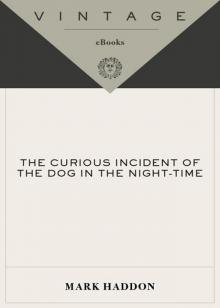 The Curious Incident of the Dog in the Night-Time
The Curious Incident of the Dog in the Night-Time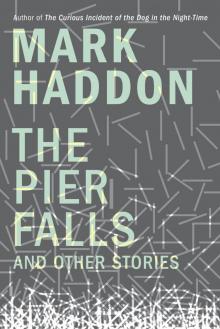 The Pier Falls: And Other Stories
The Pier Falls: And Other Stories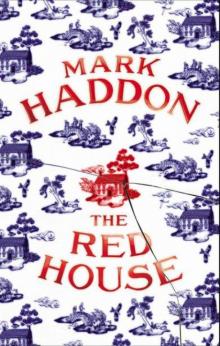 The Red House
The Red House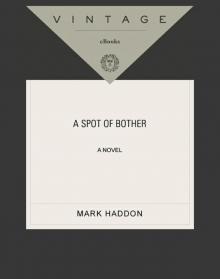 A Spot of Bother
A Spot of Bother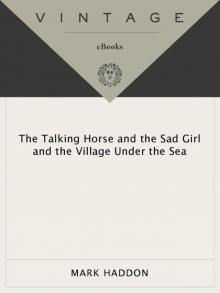 The Talking Horse and the Sad Girl and the Village Under the Sea: Poems
The Talking Horse and the Sad Girl and the Village Under the Sea: Poems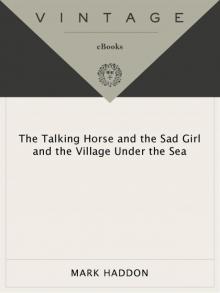 The Talking Horse and the Sad Girl and the Village Under the Sea
The Talking Horse and the Sad Girl and the Village Under the Sea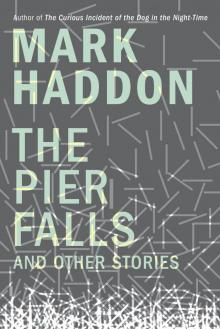 The Pier Falls
The Pier Falls